With the increasing growth of ecommerce in the modern digital age, companies must keep up with the newest developments in this field. Many companies are turning to ecommerce app development to improve their online visibility and client involvement. As such, many ecommerce app development companies have emerged, offering various services at different costs.
In this article, we will develop into the trends and advantages of eCommerce app development, highlighting the significance of this investment for businesses aiming to expand and thrive in the future. We will also compare the realms of mobile commerce and ecommerce, shedding light on the true value they bring to the table.
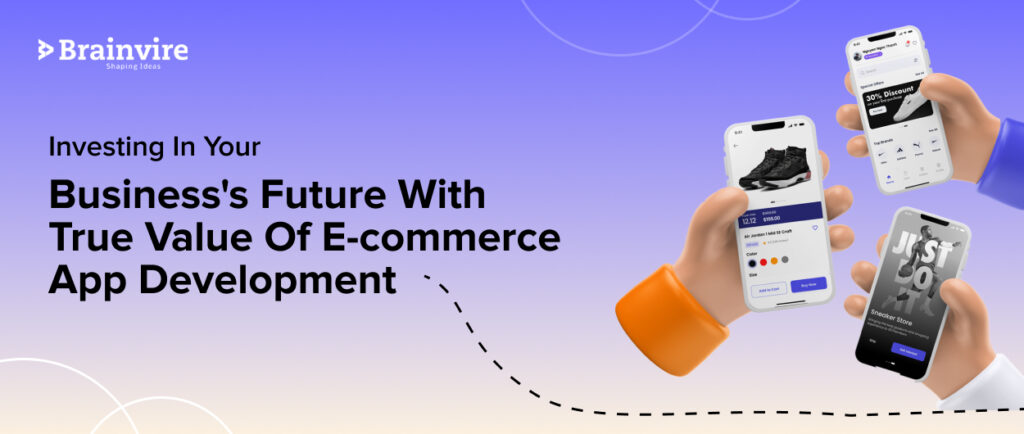
Why Invest In Ecommerce App Development?
Businesses of all sizes and across diverse fields are increasingly prioritizing investment in custom ecommerce app development. In order to thrive in today’s rapidly evolving digital economy, businesses must allocate resources to construct ecommerce apps that cater to consumer demand. Here are a few illustrative examples of why it is advantageous for firms to invest in the development of ecommerce apps:
Increased Customer Engagement And Satisfaction
The primary advantages of investing in ecommerce app development are heightened consumer engagement and enhanced customer satisfaction. By leveraging an ecommerce app, the buying experience for customers can be streamlined and made significantly more convenient. Additionally, the app facilitates the seamless progression of a shopper’s journey, starting from product discovery and extending to order tracking.
In addition, ecommerce apps typically include functions like individualized recommendations and straightforward checkout procedures that boost user involvement. Customers who experience these perks will likely be loyal and purchase more.
Expanded Market Reach And Customer Base:
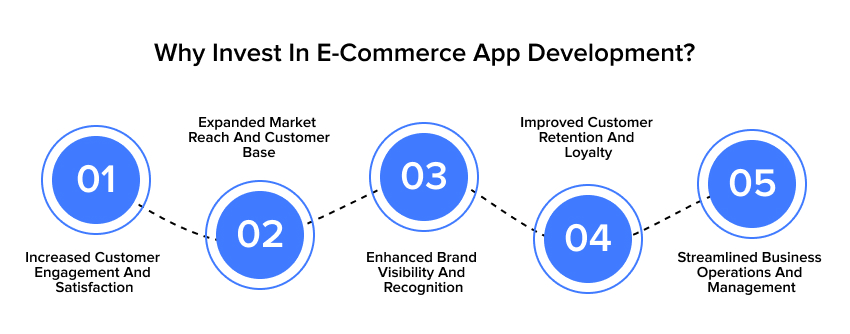
The opportunity to reach a wider audience and build a larger customer base is another major upside of investing in ecommerce app development.
Businesses can reach more clients who want to shop from their mobile devices by developing an ecommerce app. The proliferation of mobile devices means that companies that invest in ecommerce app development will have a leg up on the competition.
Ecommerce apps can also help businesses collect and analyse client data, which can be used to improve their understanding of their target market.
Enhanced Brand Visibility And Recognition:
One more way in which a company’s brand might benefit from investing in ecommerce app development is through increased exposure.

Businesses can raise client recognition and loyalty by providing users with a branded app experience. An app can also be a promotional tool, allowing businesses to reach more customers and spread the word about their offerings.
Improved Customer Retention And Loyalty:
The use of ecommerce apps may also increase client loyalty. Businesses may boost consumer happiness and loyalty by delivering a streamlined, hassle-free purchasing experience.
In addition, a mobile app lets companies provide exclusive deals and discounts to app users, who are more likely to make repeat purchases and stick with the company.
Streamlined Business Operations And Management:
Investing in creating an ecommerce app can also help with the management and organization of your company.
Managing stock, keeping tabs on orders, and providing customer support are some tasks that may be automated with a mobile app. By eliminating repetitive tasks, firms may devote more time and energy to strategic areas like product development and marketing.
More than that, ecommerce apps may give companies useful information and insights into their operations, letting them fix weak spots and boost productivity and income.
What Are The Key Features Of Successful Ecommerce App?
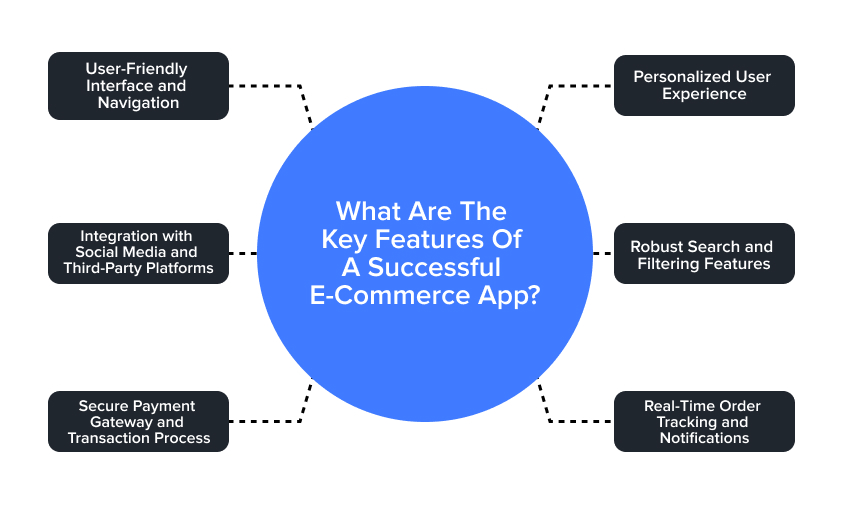
Businesses in the modern digital age need an online presence to survive. Businesses that want to boost their online presence and give customers a more streamlined and convenient buying experience often turn to ecommerce applications.
Here are some of the most important criteria for an effective ecommerce app that companies should keep in mind when they design their own:
The success of any ecommerce software hinges on having an easy-to-navigate UI. A meticulously crafted app will feature a straightforward interface that enables users to swiftly access the information they seek. Moreover, maintaining consistency in the UI across the entire app is essential, as it provides users with rapid access to diverse product categories, a search bar, and a shopping cart.
Personalized User Experience:
Online retailers prioritizing customer experience by prioritizing personalization will have a leg up on the competition. The key to a successful ecommerce app is providing a one-of-a-kind experience for each customer. This can be done using features like individualized product suggestions, filtered search results, and targeted sales and discounts.
Integration With Social Media And Third-Party Platforms:
If a company wants to expand its consumer base and reach more people online, it should use social media and other third-party platforms.

Successful ecommerce apps allow users to quickly and easily share items with their friends and followers on social networking platforms like Facebook, Instagram, and Twitter. The app should be compatible with marketplaces like Google Shopping and Amazon to expand a company’s customer base further and boost sales.
Robust Search And Filtering Features:
Consumers have come to anticipate that ecommerce apps will have advanced search and filtering options to help them quickly zero in on the exact items they’re looking for.
Customers should be able to search for items in an ecommerce app by keyword, category, or brand. The app should also offer filters that let users narrow their search results by price, color, size, and other criteria.
Secure Payment Gateway And Transaction Process:
Customers worry most about their personal information being compromised when they shop online. A reliable payment gateway and safe transaction process are essential to the success of any ecommerce platform.
The app should include a streamlined checkout procedure that makes it simple for customers to complete their transactions and employ industry-standard encryption technology to keep their data safe.
Real-Time Order Tracking And Notifications:
A successful ecommerce app will allow customers to watch the progress of their orders in real-time and notify them of any changes. Customers should be able to follow the status of their orders on the app from when they are placed until they are delivered. Customers should also be notified via the app when their orders have been shipped and are coming to them.
Choosing The Right Ecommerce App Development Team
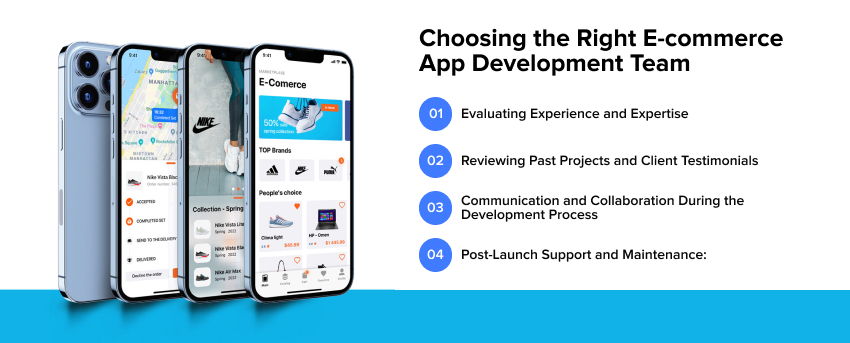
Having the right development team behind your e-commerce software can make or break its potential for success. Finding the best app developer to work with might be challenging due to the abundance of options. Here is what you need to know before hiring an e-commerce app development company:
Evaluating Experience And Expertise:
While looking for an ecommerce app development team, experience and expertise should be your top priorities. Choose a group that has worked with other companies in your industry and has a history of creating successful ecommerce apps.
You should be able to rely on the team to provide you with competent advice on app development, as well as a thorough familiarity with the latest developments in the world of ecommerce.
Reviewing Past Projects And Client Testimonials:
The team’s track record and recommendations from previous clients should also be considered. Check their previous work for examples of successful ecommerce apps they can show you. Check out reviews and comments from previous customers to learn more about the team’s communication style, work ethic, and reliability.
Communication And Collaboration During The Development Process:
Effective communication and coordination between the development team and the company are crucial to the success of an ecommerce app.
Choose a team that emphasizes working together and communicating clearly so everyone is on the same page as the project progresses. The staff should be forthcoming with information and timely updates and open to hearing your thoughts and suggestions.
Post-Launch Support And Maintenance:
Releasing an online shopping app is merely the initial stage. However, to ensure ongoing seamless functionality and the ability to cater to the evolving needs of users post-launch, regular resource allocation is imperative. It is highly recommended to employ a team with a proven track record of providing dependable and timely support following the product’s release.
How To Monetize An Ecommerce App?
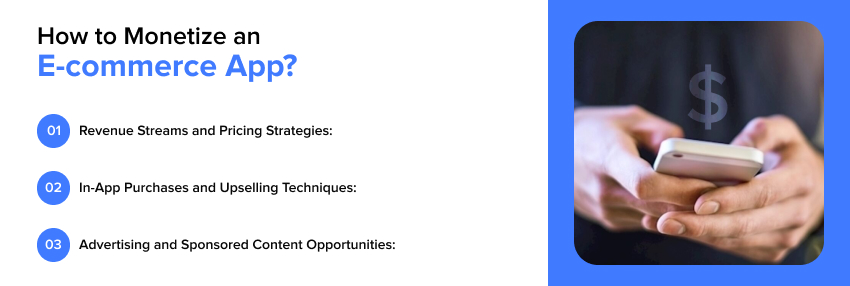
Monetizing an ecommerce app is a crucial part of any business strategy. To make money with your app, you need to know how you may monetize it and which would work best for your specific company. Ecommerce app pricing models, upselling and in-app purchase strategies, and advertising and sponsored content potential are all discussed below.
Revenue Streams And Pricing Strategies:
Businesses can generate income from an ecommerce app through various pricing models. One approach is to have users pay a monthly or annual membership fee in exchange for access to the app’s premium features and content.
Another choice is the “freemium” model, in which the app itself is free, but users must pay to unlock premium features or content.
In-App Purchases And Upselling Techniques:
Ecommerce apps can be profitable in several ways, including in-app purchases and upselling strategies.
Offering in-app purchases to consumers, such as premium content or virtual goods, is an example of in-app monetization. Upselling is a sales strategy in which a company offers users a discounted or free upgrade to a more expensive product or service.
Advertising And Sponsored Content Opportunities:
Ecommerce apps often rely on advertising and sponsored content as primary revenue sources. This necessitates collaborating with external companies to endorse their products or services within the app. Moreover, through the display of advertisements, sponsorship of content, or participation in affiliate marketing networks, the app’s developer can effectively monetize the user base.
Although advertisements and sponsored content can be lucrative revenue streams, finding a happy medium between monetization and user experience is essential.
Key Challenges in Ecommerce App Development
Developing an app for online shopping can take time and effort. While there are many upsides to creating an ecommerce app, some significant obstacles must be overcome. Here are a few of the biggest obstacles that must be overcome while making an app for online shopping.
Security And Privacy Concerns:
Protecting the confidentiality of customer information and financial transactions is a major obstacle in creating ecommerce apps. Ecommerce apps must implement stringent security measures to guard against unauthorized access, data breaches, and cyber attacks since they handle sensitive information, including credit card numbers, personal information, and order history.
To do this, it is necessary to foresee potential threats and weaknesses, establish appropriate encryption, authentication, and authorization procedures, and conduct frequent security audits and updates.
Seamless Integration With Existing Systems And Platforms:
Maintaining compatibility with pre-existing infrastructure is another obstacle unique to ecommerce app development. The most successful ecommerce apps can communicate with other platforms, including those used for stock management, delivery, logistics, and financial transactions.
Extensive planning and engagement with third-party suppliers are required to guarantee the app can communicate efficiently with these systems and provide a seamless user experience.
Maintaining Optimal Performance And Scalability:
Optimal performance and scalability are other obstacles for developers of ecommerce apps. To succeed, e-commerce apps must be able to process many transactions quickly and reliably.
Caching, load balancing, and other speed optimization techniques must be used effectively, as well as rigorous optimization of code and architecture. Ecommerce apps must also be built with scalability to accommodate growing users and transactions.
Regulatory Compliance and Legal Requirements:
The last regulatory and legal requirement for ecommerce apps is following data protection, consumer protection, and tax regulations.
Extensive planning and coordination with legal specialists are necessary to guarantee the app complies with all applicable rules and regulations. The company’s reputation and legal standing may be jeopardized if its employees don’t follow the rules.
Tips for Successful Ecommerce App Launch
Ecommerce app launches are both exhilarating and difficult. Even more crucial than building quality software is releasing it to the public so that it can reach its full potential. Here are some tips for a successful e-commerce app launch:
Developing a Marketing And Promotion Strategy:
A well-thought-out plan for advertising and promoting the release of an ecommerce app is crucial. You’ll need to figure out who you’re trying to reach and what they’re interested in, then highlight the best features of your app, write engaging and informative copy, and promote it through channels like social media, email, and paid ads more effectively.
A well-thought-out marketing campaign can help you reach your desired demographic, pique their interest, and get them to download your software.
Collaborating With Influencers And Brand Ambassadors:
Collaborating with influencers and brand ambassadors is another great tactic for a successful ecommerce app launch. These people have a large following and can help spread the word about your app by endorsing it on their behalf.
To expand your reach and get people talking about your app, team up with influential people that are a good fit for your brand and demographic.
Encouraging User Reviews And Feedback:
A successful launch of an ecommerce app also involves soliciting user reviews and comments. Finding out what users like and don’t like about your app from their evaluations is a great way to enhance the product. You may show users that their opinions are valued and that you are working to improve the app by actively seeking their feedback and reacting to user evaluations.
Measuring Success And Adjusting Strategies Accordingly:
Evaluate the results of your ecommerce app release and make changes as needed. Analyzing user feedback and reviews and monitoring important indicators like app downloads, engagement, and income can help.
The best way to maximize your apps potent-ensured ensure its continued success is to constantly evaluate its performance and alter your marketing and promotion methods accordingly.
Ecommerce App Development Best Practices
As the digital marketplace has evolved, so has the importance of ecommerce app development for businesses. Following best practices that emphasize user experience, accessibility, and continual improvement is crucial for the success of an ecommerce app development project. Here are some of the best practices for e-commerce app development:
Leveraging Cloud Computing And Serverless Architecture:
When creating, deploying, and scaling apps, cloud computing and serverless architecture have been game-changers. These technologies allow for more scalability, lower costs, and adaptability in creating e-commerce apps.
Businesses may now create scalable, high-performance ecommerce apps with global reach using cloud computing and serverless architecture.
Prioritizing User Experience And Accessibility:
The success of an e-commerce software depends heavily on its user interface (UI) and accessibility. Companies must prioritize usability, functionality, and design to ensure customer satisfaction. Ensuring users with disabilities or impairments can still use the app is another crucial aspect of accessibility. Businesses can improve their ecommerce app’s usability and accessibility by adopting user-centric design practices and testing them with real customers.
Implementing Data Analytics And User Feedback Mechanisms:
E-commerce app development relies heavily on data analytics and feedback methods for users. Analytics solutions allow firms to monitor important KPIs like app downloads, user actions, and conversion rates.
Using this information, we can fix the app’s flaws and make it run better than ever. User surveys and star ratings are two feedback tools that can yield useful information about the user experience and direct product improvement efforts.
Continuous Development And Improvement Through Agile Methodology:
The Agile technique emphasizes continuous improvement and expansion in planning, coding, testing, and releasing. Moreover, Agile enables firms to swiftly adapt to changing market conditions and customer preferences, leading to a progressively enhanced ecommerce app.
In addition to fostering a more efficient development process, this method encourages open lines of communication and collaboration among programmers, stakeholders, and end users.
Future Trends In Ecommerce App Development
The past decade has seen a steady rise in e-popularity and commerce, and with the continued development of technology, ecommerce app development has a bright future. The following are some predictions for the near future of eCommerce app development:
Advancements In Artificial Intelligence And Machine Learning:
Experts anticipate that AI and ML will play a pivotal role in the future of ecommerce app development. Improve the user experience with the help of these technologies, which can do everything from optimizing search results to providing product recommendations and even forecasting user behavior.
Automating customer service and stock management are just a couple of instances where the application of AI and ML can yield significant advantages in the ecommerce process. In fact, there are numerous other tasks that can greatly benefit from these technologies.
Integration With Virtual And Augmented Reality Technology:
Online retailers quickly adopt virtual and augmented reality (VR/AR) technologies. By letting customers see things in 3D and even try them on virtually, these technologies can provide a truly immersive retail experience. More and more ecommerce apps will use VR and AR as the technology becomes more widely available.
The Role Of Blockchain And Cryptocurrency In Ecommerce Transactions:
Blockchain and cryptocurrencies are gaining traction in online retail. By cutting out the middleman, these innovations provide users with a safer and more open method of conducting financial transactions.
Blockchain technology can aid in the fight against counterfeiting by tracing the validity and origin of goods.
Increased Emphasis On Sustainability And Ethical Practices:
As shoppers become increasingly conscientious about their impact on the world, we can expect a rise in the number of ecommerce apps that prioritize social and environmental responsibility.
As part of this effort, we use recyclable or compostable packaging, only work with reputable manufacturers, and push for full supply chain visibility. Eco-conscious shoppers may be more inclined to use ecommerce apps emphasizing ethical and sustainable business operations.
To Sum Up
Investing in creating an ecommerce app can have far-reaching consequences for your company’s future. Furthermore, with the growing popularity of online shopping and its ease, an ecommerce app can assist you in reaching more customers, providing them with a better shopping experience, and streamlining your business processes.
App development can have an up-front expense, but the long-term advantages and return on investment can be well worth it. Developing an ecommerce app should be a company’s top goal to succeed in the modern digital marketplace.
Stay tuned for more: 10 Pain Points Of eCommerce Customers & Their Possible Technology Solutions
FAQs
Several variables can affect how long it takes to create ecommerce software, including the app’s complexity, features, functionality, platform, and team size. However, the time required to create an ecommerce app might range from three to nine months.
Creating an ecommerce app involves ensuring app security and compliance, integrating different payment methods, optimizing app performance, offering a seamless user experience, and keeping up with emerging technology trends.
Security methods like encryption, two-factor authentication, and secure payment gateways can help keep your ecommerce software safe and in line with all applicable laws and regulations. You can also talk to lawyers and regulators to ensure your app complies with all the rules and laws that apply to it.
Ecommerce app promotion tactics that have been successful include search engine optimization, social media, influencer and blogger partnerships, referral programs, discounts, and paid advertising through platforms like Google Ads and Facebook Ads.
Some cutting-edge practices in ecommerce app development include: voice-enabled search and chatbots; augmented and virtual reality integration; personalized suggestions and experiences; mobile-first design; and AI/machine learning.
Related Articles
-
Traits of The Great Mobile Application Development Company
Are you planning to build a mobile application for your business? Do you want to get it done from the best team of professionals? Are you thinking to hire a
-
How to Earn Money from your Mobile Application?
The first and foremost thing you need to consider is: Is your mobile app going to make money? Unless you generate revenue, you can’t make any significant change as a
-
Have you developed your Ecommerce Platform with Odoo Integration? Learn From These Simple Tips!
Odoo is a framework that can help your business to smooth the management and operational process. It has been utilized by leading brands across the globe and named as truly




